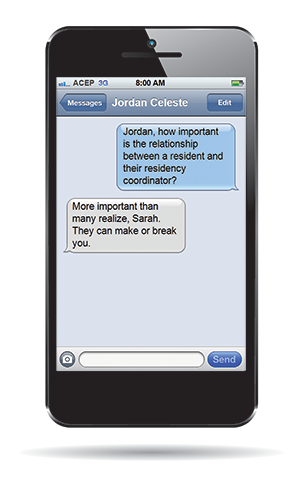Those coordinators who preferred to remain anonymous were quite specific about the consequences of not respecting or cooperating with your residency coordinator.
Explore This Issue
ACEP Now: Vol 33 – No 05 – May 2014
When I entered the business world, my savvy mom (a training and development expert) gave me some crucial advice: make friends with the support people first—they can make you or break you! Residency program coordinators fit quite nicely into that equation. I caught up with several of them to get some interesting insights into how they affect the residents they guide, assist, and support every year.
Two Different Approaches to Coordination
Eve Dinh has been coordinating the emergency medicine residents at University of California, San Francisco for a little less than seven years, and while she says the job keeps her on her toes, she enjoys the wide variety of hats she wears on any given day. Cindy Rush is a veteran, coordinating the residency program at Texas A&M’s Scott & White Healthcare for the past 22 years, and sees herself as the ultimate gatekeeper. The other contributing residency coordinators requested anonymity for reasons that will be apparent.

Sarah Hoper, MD, recently joined the staff at Vanderbilt University. She is interested in health policy and is the legislative advisor for the Emergency Medicine Residents’ Association (EMRA). EMRA President Jordan Celeste, MD, is a fourth-year resident at Brown University in Providence, RI, and will be heading to Florida this summer to begin practice.
Both women have a different approach to the job based on their experience and longevity. Ms. Dinh keeps the relationship between herself and the residents friendly but professional, while Ms. Rush’s residents don’t hesitate to call her Mom. Ms. Dinh sees her strongest value to the residents as a facilitator and liaison, a general resource for everything from schedules and procedures to coordinating resident paychecks. Now on her fourth program director, Ms. Rush has retained a nurturing role with her residents, protecting them at every turn, particularly after a very sad incident early in her tenure that took the life of one of them. While Ms. Dinh leaves much of the nurturing role to her program director, Susan Promes, MD, she makes herself available pretty much 24-7 should the need arise. Ms. Rush is a steady supportive wall at the frontlines, even advising residents on the potential dangers of social media and guiding their steps through the residency process.
When it comes to a resident’s job search, their approaches also differ. Ms. Dinh will disseminate information as it comes in from various sources. As job information comes in from recruiters and groups, it is put into a binder that residents can access at will. If, however, something comes in and she knows a resident is looking in that specific area, she’ll forward it directly to the resident. Ms. Rush’s residents will come to her for advice and referrals to those residents who have come before them, many of whom are now hiring or in an administrative capacity. She’s a one-woman shopping stop for the Texas job market. Ms. Rush functions as a real career guide, while Ms. Dinh is more of a referral source for incoming information.
Both women agree that a portion of what they do for the residents happens after they find a job. The incredible amount of paperwork that has to be provided for credentialing primarily comes from the coordinator’s files. It’s a laundry list of documents, from diplomas to vaccination certificates, that would choke a mule. They also handle reference requests and verifications.
The Dark Side of Residency Coordination
By now, if you are a resident reading this, your head must be spinning as you realize what your residency coordinator does for you and what impact that can have on your future. Well, it’s not all about service. In many places, the golden rule applies. If you don’t treat your residency coordinator with respect and appreciation, best of luck to ya. Those coordinators who preferred to remain anonymous were quite specific about the consequences of not respecting or cooperating with your residency coordinator. They reported having done the following, and any of these could conceivably happen to you:
- Gave your phone number out to every recruiter who calls in
- Kept job profiles from getting to you
- Held up your credentialing paperwork
- Held up your references—even engineering negative reference information
Neither Ms. Dinh nor Ms. Rush would dream of resorting to the tactics mentioned above, but both stated that they can understand the frustrations other coordinators might experience with uncooperative residents.
Residency coordinators have the ability to smooth the path and provide invaluable assistance in a job search—or to make it a very difficult task. But the truth is that residency coordinators are your guides, your champions, your first and best defense, and all the things that make the residency experience a positive and fruitful one. So let me give you a little piece of advice before you depart your program for new jobs and untold riches: don’t forget to say thank you to the person who helped you achieve success!
 Barb Katz is the president of The Katz Company EMC, a member of ACEP’s Workforce and Career Sections, and a frequent speaker and faculty at conferences and residency programs. She can be reached at katzco@cox.net.
Barb Katz is the president of The Katz Company EMC, a member of ACEP’s Workforce and Career Sections, and a frequent speaker and faculty at conferences and residency programs. She can be reached at katzco@cox.net.
Pages: 1 2 | Multi-Page




No Responses to “Residency Coordinators Can Be Allies of Emergency Medicine Residents”